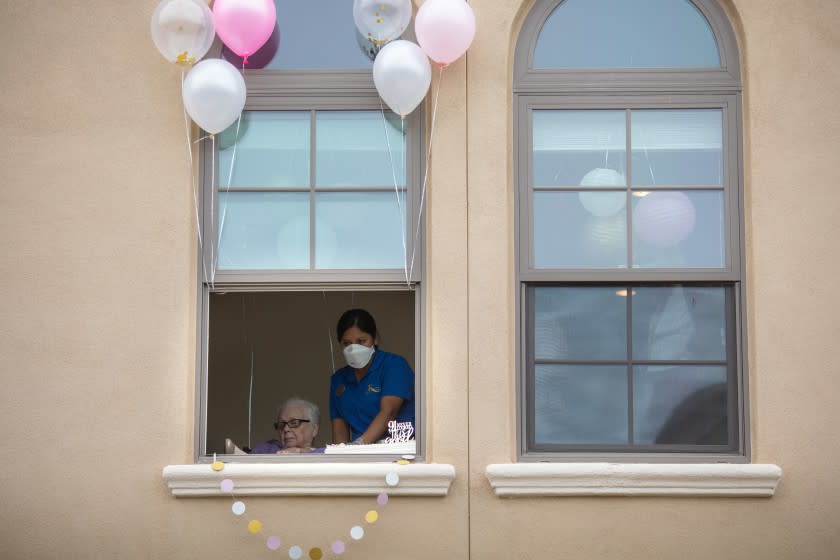Op-Ed: My mother has Alzheimer's. The coronavirus only makes it harder to care for her

My 83-year-old mother was scheduled to move into a skilled nursing facility near our home in Birmingham, Ala., on March 23. The global pandemic put a wrench in those plans.
As things open up in our state, my family wonders how to continue to protect Mom amid so much uncertainty. While many questions remain about COVID-19’s trajectory and the preparedness of nursing homes to shield residents from infection, our confidence in caring for her — Mom suffers from numerous physical limitations and late Alzheimer’s disease — is wavering.
On her best days, Mom is funny and engaged.
On her worst days, she forgets how to sit, stand or swallow. She wanders the hallways at night, stopping when she reaches doors with childproof locks or rooms we’ve blocked off for her protection. She falls, and we all come running to make sure she hasn’t broken a bone. She asks whether my mother is still living and why my dad, who died in 2018, hasn’t come home for dinner.
Unfortunately, she experiences more bad days than good as her disease progresses.
Mom moved to Birmingham from a long-term care facility in Illinois in August. She’d lived her entire life in DeWitt County, married to a farmer and involved in a flurry of church activities and community organizations. She knew everyone, including other residents at the nursing home and the locals who came to visit.
Here, everything is new. A household structured around my and my husband’s work obligations. College-aged granddaughters coming and going. New doctors. New church. New community. Change isn’t easy, especially for an 83-year-old who’s facing a frightening disease that, at her most coherent, she understands. Somewhat.
So far, we’ve dodged the coronavirus bullet at our house. With reports of the steep toll COVID-19 has taken in nursing homes across the country, we are thankful that Mom wasn’t in that particular line of fire. And we are fortunate to have a wonderful aide who helps with her care most weekdays.
But to maintain our current arrangement may affect both Mom’s safety and my own survival. My history with breast cancer and cardiac issues make my responsibilities as her chief caregiver difficult.
Mom’s condition requires me to steer her in and out of a wheelchair. Hold her up with a “gait belt” while my daughter helps her pull up her pants. Brace her when she attempts to use the walker or transition into her favorite recliner, which she brought from Illinois. I go to bed and wake up with pain in my arms, back and abdomen. I’m short of breath when there are too many things going on at once to do the breathing exercises I learned at cardiac rehab. I’m depressed and I constantly feel inadequate.
I have power of attorney for Mom, so designated as my parents aged. I cared for Dad during the final nine months of his life and made the call to take him off machines when it was clear that his quality of life wouldn’t honor what he wanted.
But with COVID-19 looming, there’s so much that I can’t know as I try to make decisions about what’s in Mom’s best interest. The facility we’ve chosen in Birmingham, with Mom’s approval, offers delicious meals and social activities in addition to 24-hour nursing care and therapy. It’s lovely, a far cry from the frightening almshouses where the elderly and infirmed were housed alongside those labeled insane or even the improved, yet dismal places I entered as a kid to sing Christmas carols to residents gathered in the common room.
Before the pandemic hit, Mom was excited about decorating her room at the nursing home and about the new friends she would make. We’d be stopping by every day, taking her out for a meal or an afternoon at the park and bringing her home for holidays and special occasions.
But if we move her now, she would disappear behind a veil of quarantine secrecy and fear. I couldn’t pop by for surprise visits or check up on her care in person. I could wave from outside her window or converse through a computer screen, but both are poor substitutes for sharing a hug and being present while she recounts her day. And all the while, I would know that nursing home coronavirus tolls were only mounting.
So, we wait.
Cynthia Ryan is associate professor of English at the University of Alabama at Birmingham.

